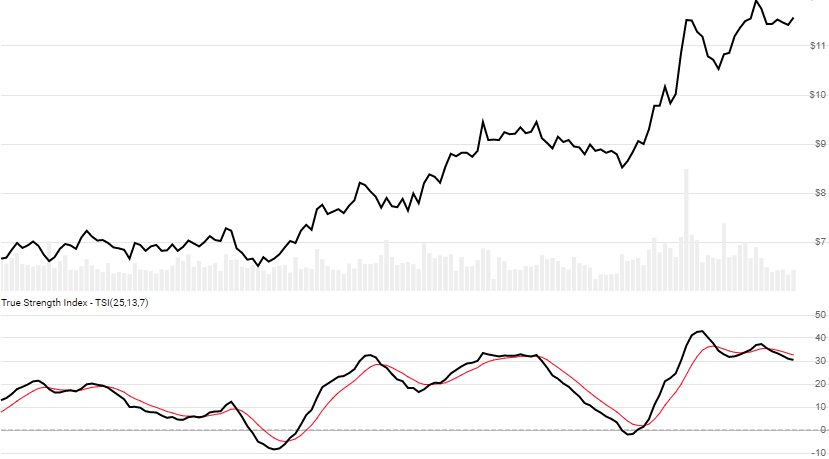True Strength Index (TSI)
get_tsi(quotes, lookback_periods=25,smooth_periods=13, signal_periods=7)
Parameters
| name | type | notes |
|---|---|---|
quotes | Iterable[Quote] | Iterable of the Quote class or its sub-class. • See here for usage with pandas.DataFrame |
lookback_periods | int, default 25 | Number of periods (N) for the first EMA. Must be greater than 0. |
smooth_periods | int, default 13 | Number of periods (M) for the second smoothing. Must be greater than 0. |
signal_periods | int, default 7 | Number of periods (S) in the TSI moving average. Must be greater than or equal to 0. |
Historical quotes requirements
You must have at least N+M+100 periods of quotes to cover the convergence periods. Since this uses a two EMA smoothing techniques, we recommend you use at least N+M+250 data points prior to the intended usage date for better precision.
quotes is an Iterable[Quote] collection of historical price quotes. It should have a consistent frequency (day, hour, minute, etc). See the Guide for more information.
Return
TSIResults[TSIResult]
- This method returns a time series of all available indicator values for the
quotesprovided. TSIResultsis just a list ofTSIResult.- It always returns the same number of elements as there are in the historical quotes.
- It does not return a single incremental indicator value.
- The first
N+M-1periods will haveNonevalues since there’s not enough data to calculate. signalwill beNonefor all periods ifsignal_periods=0.
⚞ Convergence warning: The first
N+M+250periods will have decreasing magnitude, convergence-related precision errors that can be as high as ~5% deviation in indicator values for earlier periods.
TSIResult
| name | type | notes |
|---|---|---|
date | datetime | Date |
tsi | float, Optional | True Strength Index |
signal | float, Optional | Signal line (EMA of TSI) |
Utilities
See Utilities and Helpers for more information.
Example
from stock_indicators import indicators
# This method is NOT a part of the library.
quotes = get_historical_quotes("SPY")
# Calculate 20-period TSI
results = indicators.get_tsi(quotes, 25, 13, 7)
About True Strength Index (TSI)
Created by William Blau, the True Strength Index is a momentum oscillator that depicts trends in price changes. [Discuss] 💬
